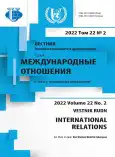Space and Counter-Space Activities of Great Powers in Outer Space
- 作者: Islam M.1
-
隶属关系:
- Bangabandhu Sheikh Mujibur Rahman Science & Technology University
- 期: 卷 22, 编号 2 (2022): Non-Western World in Cyberspace
- 页面: 397-410
- 栏目: 国际安全
- URL: https://journal-vniispk.ru/2313-0660/article/view/320551
- DOI: https://doi.org/10.22363/2313-0660-2022-22-2-397-410
- ID: 320551
如何引用文章
全文:
详细
The article is dedicated to outer space as a space, including the Moon and other celestial bodies, open for exploration and use by all. Celestial bodies are natural resources of the common heritage of humanity. Their exploration and use for the benefit and discovery of all countries is the result of the ownership of all mankind. However, since the end of the 20th century and especially in the 21st century, outer space has gradually become militarized. This is due to changes in the system of warfare, which is likely to be heavily transformed in the coming future. In this transformational system, all domains of warfare will be interlinked and outer space will play a significant role. One example of such processes is the Gulf War, also called the First Space War, in which the US Army successfully used the outer space systems for its Command, Control, Communications, Computers, Intelligence, Surveillance and Reconnaissance (C4ISR) activities. Since then, outer space has become an integral part of US military operations. Consequently, other great powers like Russian Federation and People’s Republic of China are also trying to develop the same capability to counter US dominance in outer space. Simultaneously, the US is continuing its counter-space capabilities to maintain the dominance in outer space. The growing dependence on outer space is not only applicable to the military operation but also to commercial and civilian activities. As a result, great powers are more actively engaging in various space and counter-space activities to pursue their national interests; such activity turns outer space into an arena for inter-state rivalry.
关键词
作者简介
Md Badrul Islam
Bangabandhu Sheikh Mujibur Rahman Science & Technology University
编辑信件的主要联系方式.
Email: badrul.islam@bsmrstu.edu.bd
ORCID iD: 0000-0002-2990-3663
Lecturer, Department of International Relations
Gopalganj, Bangladesh参考
- Ali Khan, S., & Imam, I. (2019). Outer space and strategic stability in South Asia. Astropolitics, 17(1), 70-76. https://doi.org/10.1080/14777622.2019.1578936
- Ali, S., & Khalil, T. (2018). Debating potential doctrinal changes in India’s nuclear ambitions. IPRI Journal, 18(2), 53-77. https://doi.org/10.31945/iprij.180203
- Berkowitz, B. (2011). The National Reconnaissance Office at 50 years: A brief history. Chantilly, Virginia: Center for the Study of National Reconnaissance.
- Clark, R. M. (2010). The technical collection of intelligence. Washington, DC: SAGE Publications.
- Cordesman, A. H. (2016). China space strategy and developments. CSIS Report, 1-34. Retrieved from https://www.csis.org/analysis/china-space-strategy-and-developments
- Erickson, A. S. (2013). Chinese anti-ship ballistic missile (ASBM) development: Drivers, trajectories, and strategic implications. Washington, DC: Jamestown Foundation/Brookings Institution Press.
- Fukushima, Y. (2013). Debates over the military value of outer space in the past, present and the future: Drawing on space power theory in the US. NIDS Journal of Defense and Security, (14), 35-48.
- Graham Jr., T., & Hansen, K. A. (2012). Spy satellites and other intelligence technologies that changed history. Washington, DC: University of Washington Press.
- Harrison, T., Hunter, A., Johnson, K., Roberts, T. G., & Linck, E. (2017). Beyond the RD-180. Report of the CSIS Aerospace Security Project, 1-48. Retrieved from https://aerospace.csis.org/beyond-rd-180/
- Jackson, N. J. (2018). Outer space in Russia’s security strategy. Simons Working Paper in Security and Development, (64), 1-22. Retrieved from https://summit.sfu.ca/item/18164
- Jaramillo, C. (Ed.). (2011). Space security 2011. Kitchener, Ontario: Pandora Press.
- Karimi, H. A. (2016). Advanced location-based technologies and services. CRC Press.
- McClintock, B. (2017). The Russian space sector: Adaptation, retrenchment, and stagnation. Space and Defense, 10(7), 3-8.
- Mendenhall, E. (2018). Treating outer space like a place: A case for rejecting other domain analogies. Astropolitics, 16(2), 97-118. https://doi.org/10.1080/14777622.2018.1484650
- Moltz, J. C. (2019). The changing dynamics of twenty-first-century space power. Journal of Strategic Security, 12(1), 15-43. https://doi.org/10.5038/1944-0472.12.1.1729
- Montluc, B. de. (2010). Russia’s resurgence: Prospects for space policy and international cooperation. Space Policy, 26(1), 15-24. https://doi.org/10.1016/j.spacepol.2009.12.002
- Mowthorpe, M. (2002). US Military space policy 1945-92. Space Policy, 18(1), 25-36. https://doi.org/10.1016/S0265-9646(01)00055-8
- Myers, N. (2018). The Russian aerospace force. Security Forum, 2(1), 91-103. https://doi.org/10.26410/SF_1/18/8
- Nye, J. S., & Schear, J. A. (1988). Seeking stability in space: Anti-satellite weapons and the evolving space regime. Lanham, MD, London: University Press of America for Aspen Strategy Group.
- Quintana, E. (2017). The new space age: Questions for defence and security. The RUSI Journal, 162(3), 88-109. https://doi.org/10.1080/03071847.2017.1352377
- Shen, D. (2011). A collaborative China - US approach to space security. Asian Perspective, 35(4), 521-536. https://doi.org/10.1353/apr.2011.0022
- Tellis, A. J. (2007). China’s military space strategy. Survival, 49(3), 41-72. https://doi.org/10.1080/00396330701564752
- Tronchetti, F. (2020). The privatization of Chinese space activities: A legal and regulatory perspective. Journal of Space Law, 44(2), 565-590.
- Weeden B., & Samson, V. (Eds.). (2018). Global counterspace capabilities: An open source assessment. Report of Secure World Foundation, 1-148. Retrieved from http://swfound.org/media/206118/swf_global_counterspace_april2018.pdf
- White, T. D. (1958). Space control and national security. Air Force Magazine, 41(4), 80-83.
补充文件









